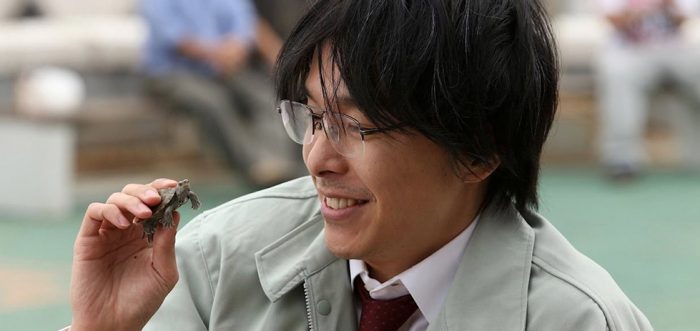
Love and Peace opens with a segment from a fictional panel show, featuring the hosts discussing the 2020 Tokyo Olympics. Ryuichi Suzuki is introduced while watching the program, describing himself as “a clerk in the day, rockstar by night.” This introspection quickly establishes Suzuki as both a n outcast, as well an imaginative introvert. This is further enforced in an early series of surreal scenes where the hosts of the show berate Suzuki with comical derision – “his name repulses me”, “why does he exist”, etc. This opening isn’t dissimilar from a typical Sono work; it playfully bends reality, toys around with mass media, and introduces a fairly tormented protagonist. Straight away, Sono’s style – honed in psychological thrillers and horror films – is at play, making it fairly easy to fall into thinking that Love and Peace is a similar work to Sono’s better-known movies. In a lot of ways, it is, especially in terms of characteristic approaches to style and pace. In one way, however, it’s very different: it’s a kids movie – or at least, a movie for ‘the whole family’. In other sense, it’s Sono’s assertion of his malleability as a director, with Love and Peace eventuating as a film existing significantly outside of the directors comfort zone, yet remaining both surprisingly strong and coherent throughout.
The narrative sits at the point of conflict between Suzuki’s dreams, ambition and his reality. Sono uses techniques from his lengthy background in psychological thrillers and horrors, albeit in a different context; comedic commentary on social alienation. There’s a lot of self-effacing dialgoue from Suzuki, at one stage referring to himself as “an iceberg” before elaborating that “You see only icebergs tip. Most of me is underwater.” Sono’s ear for comedy, as well as his playful and often youthful sense of creativity – visually arresting and saturated in colour – fits well with a family-oriented film; while still resulting in something fairly unique from the director. It’s interesting throughout Love and Peace to see the oft-niche and divisive Sono making such an accessible work, where the director doesn’t compromise style, but comes off as far less alienating than in his bolder pieces.
The degree of silliness in the plot is refreshing as well, with the premise being Suzuki rising to fame after losing his pet turtle and writing as a song about it (titled “Love and Peace”), which becomes an pop sensation. Pikadoo, the aforementioned turtle that falls into the sewer, ends up hanging out with a homeless man living underneath Tokyo, alongside a group of CGI-animated lost animals and toys. The scenes are imaginative and fun, but Sono carries through with his recent approach to pacing – with little filler, and a constant sense of momentum. The film jumps from drama to action to adventure, even flirting with the idea of offering itself up as a monster movie.
In the end, it’s carried by Sono’s particular sense of style, with crucial elements of Love and Peace resonating and echoing the directors earlier works: mysterious kidnapping, enigmatic pop figures, cultish adoration – all transposed into the sphere of a family film. The work is reminiscent of a lengthy fascination with pop idols in Japan, with a lot in common with the Manga series and film adaptation of Detroit Metal City1. There’s still a depth to the work, with fairly direct parodies of narcissistic popstars (with a pointed “I can change the world” prod at Bono). There’s even a bit of Sono’s fascination with immensely structured secret organisations, one of which kidnap and genetically enlarge the turtle at one stage of the film. In the end, Love and Peace is an amusing study of fame that rides on Sono’s characteristic disregard for reality – that plays out like a more concise, and less perverted Love Exposure, clearly aimed at younger audiences. Whether a comment on escapism, isolation in Japan, or as a simple family movie, Love and Peace is a confident and well-constructed work that reaffirms the strength and flexibility of Sono as one of Japan’s most hard-working filmmakers.
